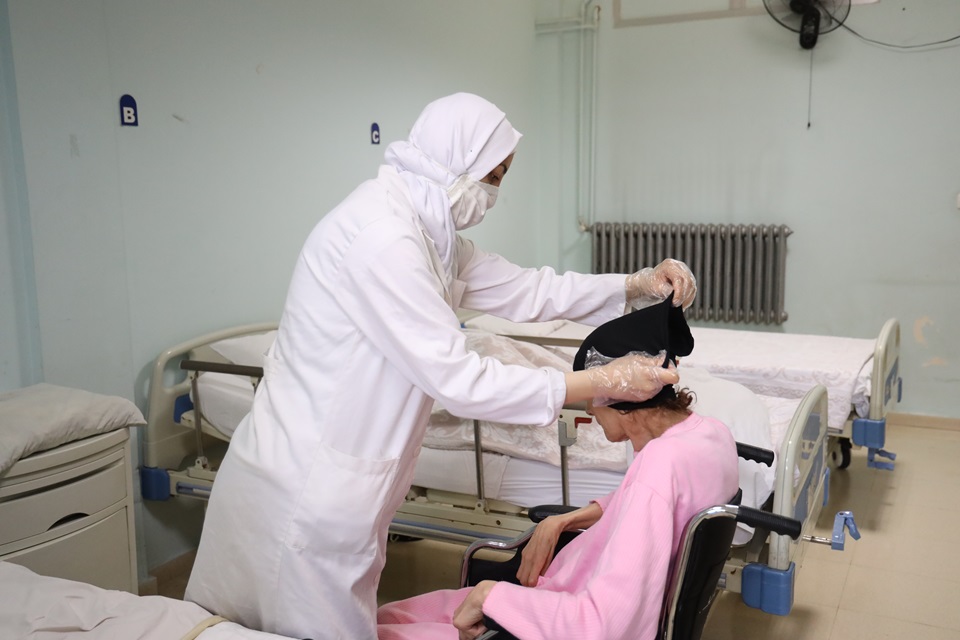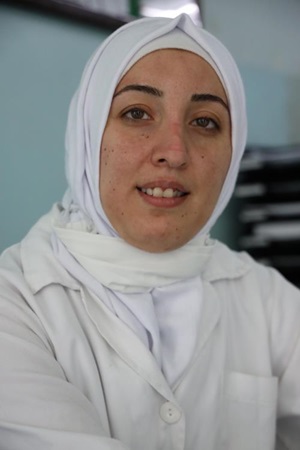A Refugee Woman among COVID-19 Frontline Responders
Date:

Elderly people have been identified as one of the most vulnerable groups to the COVID-19 pandemic and keeping them safe has become both a priority and a challenge for governments around the world. In times where health systems are overstretched and healthcare workers are overwhelmed, Rim Al Khalif, a Syrian refugee, is improving her skills to care for elderly patients in Tripoli, Lebanon.
In Lebanon, Syrian refugee women have often limited opportunities for professional development. A UN Women study indicates that Syrian women are 6 times less likely to be working compared to Syrian men, with labor force participation estimated at 10 per cent for women, compared to 65 per cent for men in 2019. The situation is even more complex in the context of Lebanon’s dramatic economic downturn, in addition to the sharp surge in coronavirus confirmed cases in Lebanon. Following the deadly Beirut port explosion on 4 August, COVID-19 infections reached record highs in the country, above 35000 cases, by end of September 2020. Due to the Beirut explosion, 300,000 people lost their homes and for those who were already living in overcrowded settings, isolating or quarantining at home in case of an infection, has become impossible.
For Rim Al Khalaf, a 34-year old Syrian refugee woman based in Tripoli, having access to training and a job in health care was not an easy task.
Originally from Talkalakh, in Syria’s Homs Governorate, and like many of her fellow citizens, Rim was forced to flee with her family to neighboring Lebanon in 2012, just one year after the war erupted in her country. As a result, she had to stop her nursing studies during her second year at school.
Her family first settled in Akkar, then in Tripoli, in Northern Lebanon, where Rim tried to complete her education but was told she was ‘too old’ to enroll at nursing school.
With the help of UN Women, in partnership with the Agency for Technical Cooperation and Development (ACTED), things would soon change for the better.

After an assessment, based on questions about previous training, work experience and other criteria, Rim joined a two-month training in home-based health care which included courses on patient care, administration of medical treatments and communication with both patients and medical personnel. This training is one of many activities conducted by UN Women Lebanon and ACTED in Tripoli, in the context of a project supported by the United Nations Human Security Trust Fund.
The project’s activities focus on girls and women, both Syrian refugees and Lebanese, providing them with skills trainings as well as awareness-raising sessions on gender-based violence, in order for them to know and better understand their rights and access protection services.
Rim proved to be a hard-working and an engaged trainee. Driven by her passion for learning, she completed 120 hours of training, over a period of 10 weeks. Thanks to her high score in the post-training test, and the skills she demonstrated to have during the practical exercises -she was selected to complement her theoretical training with on-the-job training through an internship opportunity at the Social Services Medical Center, an elderly healthcare center in Tripoli.
The internship opportunities enable trainees to enhance their technical skills, interact with the public and put in practice what they have learned. This practical training is also helping Syrian refugee women to have better work opportunities when they return to their home country.
During the internship, Rim committed to a total of 80 hours of work, stretched over a period of two months; however she volunteered to work extra hours. Rim proved to be a fast learner with an ability to tune in to engage and comfort people. Once she finished the internship, she enrolled in a cash-for-work programme, as an elderly care worker, in the mental health department at the same center.
“When I was accepted for the job placement, I was afraid not to know how to correctly assist and help the elderly. It was difficult at first to deal with patients who cannot perform daily simple tasks, but soon I got used to it,” recalls Rim.
Her daily routine includes supervising patients’ medication intake, feeding, bathing and monitoring patients’ body temperature, blood pressure, and glucose level as well as dealing with superficial wounds, when required.
“This experience is completely life-changing. I saw a huge improvement in my life and my overall wellbeing,” says Rim.
In Lebanon, women make up 80% of the country’s registered nurses, and while the country has a surplus of physicians, it has a chronic shortage of nurses – lagging behind regional and global nurse density statistics.
As a result, the country’s overburdened healthcare system is increasingly dependent on women and girls to shoulder care responsibilities for ill family members, the elderly and children. Rim is aware of this reality. “My responsibilities require a high level of personal care and also compassion, patience, open-mindedness and ability to stay alert specifically in the context of the recent COVID-19 pandemic."
“Since the COVID-19 outbreak in Lebanon, women frontline health personnel have been working in precarious conditions. They face serious challenges, including unsafe and often dangerous conditions, and the patient nurse ratios are increasing exponentially, with care at 1 to 18, over double the suggested proportion. We need to use all the resources available to us to expand the pool of trained and qualified care personnel available in Lebanon, and to provide them with safe and decent working conditions” says Rachel Dore-Weeks, head of UN Women Lebanon.